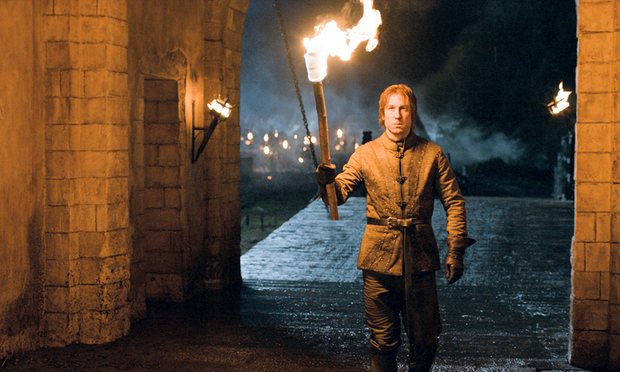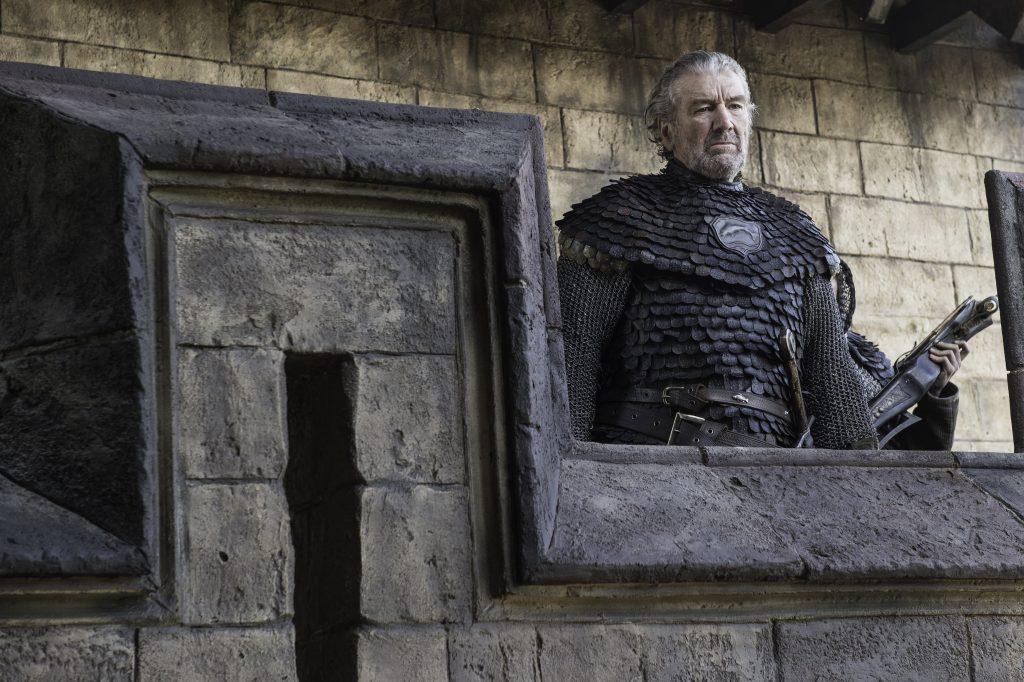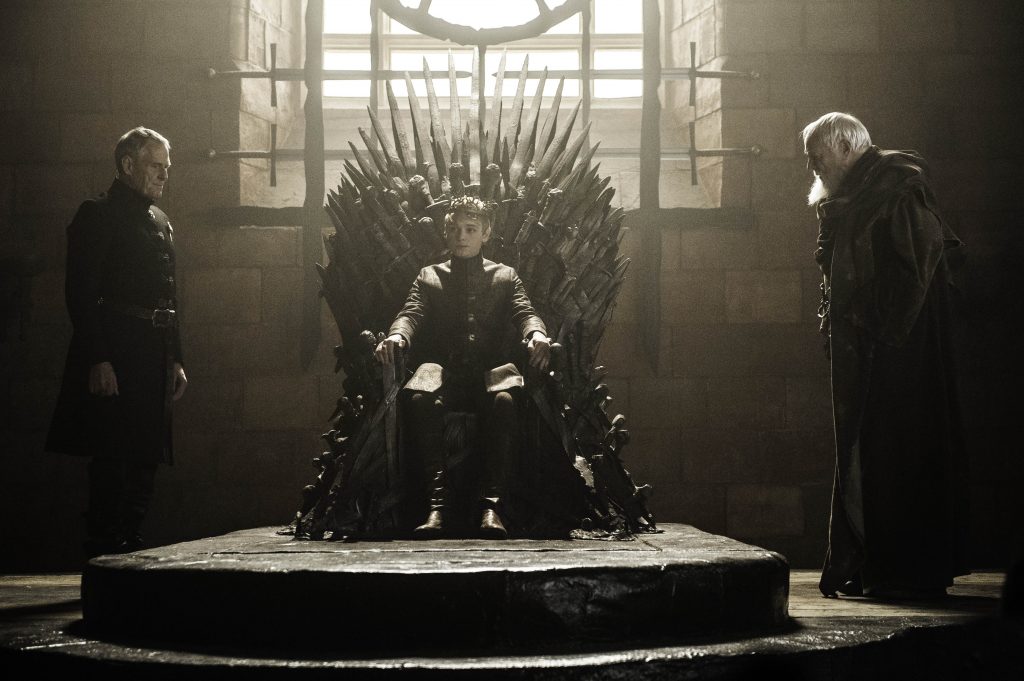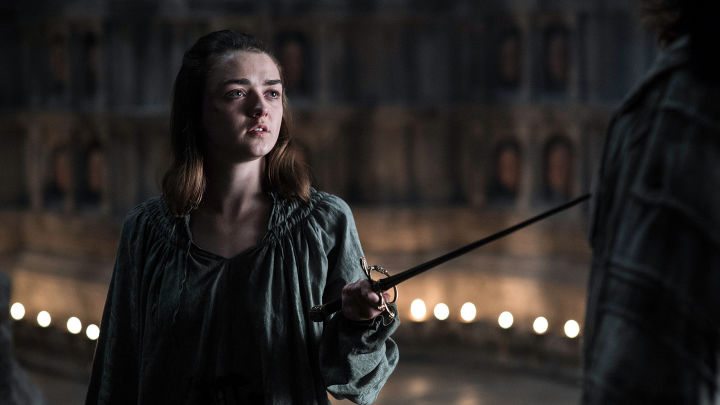There was a moment in this week’s episode that crystalized much of Game of Thrones’s plot, thematic variations, and, of course, its underlying quasi-medieval reality. And, perhaps amazingly enough, it has nothing to do with violence – and everything to do with obedience.
When Lord Edmure Tully is sent to retake Riverrun for his captors, the Lannister-Baratheon-Frey alliance, he issues simple, quiet demands and fully expects his bannermen and smallfolk to comply. They don’t disappoint, even when they have a strong, well-reasoned voice in the form of Ser Brynden Tully chastising them to employ that ethereal phenomenon called critical thinking, and even when the orders are obviously at odds with what House Tully’s obligations to self-survival would ordinarily entail. Such is the nature – and the power – of a hierarchical society.
That not one Tully man is seen objecting to Lord Edmure’s edicts is hugely dispiriting to a modern viewer; the individual has irrevocably moved to the center of the political, social, and cultural world, even if we as a people still alarmingly tend to unthinkingly follow whatever handler happens to be at the head of the herd. But the development isn’t just meant to be illustrative of the vast differences between present-day and medieval social orders – it also touches upon one of the many main throughlines that Game of Thrones actively spins while wildly careening from one shocking plot development to the next. Lords issue commands; smallfolk have no choice but to obey.
It’s an affliction that even infects the aristocracy itself; King Tommen Baratheon has been seduced by the Faith, essentially allowing the High Sparrow to become the supreme political arbiter as well as the chief spiritual one (although this is greatly abetted by the womanly wiles of Tommen’s wife, Queen Margaery, and is even permissible in the first place by his being an individual who has no strong intrinsic sense of leadership or, even, of self; whoever he is in orbit of produces his current objectives, whether that be Lord Tywin or his mother, Queen Regent Cersei, or the High Sparrow himself). One can even make the argument that it is precisely the same arrangement that saddled King Stannis Baratheon, with the High Sparrow being replaced by the Lady Melisandre and the Seven with R’hllor – or the argument that the exact interplay between faith and governance is yet another of the thematic considerations that the show constantly plays with.
But perhaps the most salient way that this mindlessness, as we would call it in a modern context, is expressed is in the orthodoxy of the Faceless Men. When Arya Stark fails to carry out her mission to assassinate Lady Crane, she herself becomes a target, since the Many-Faced God needs a life that is owed to him; it is the numbers here that matter, not the individual person, making it as dispassionate and objective as possible (which, in turn, makes the order’s existential insistence on “no one” understandable). This explains why, when Arya uses this to her advantage and instead offers up the Waif’s life in place of her own, Jaqen H’ghar is so willing to accept the situation (although it doesn’t explain how or why Crane still has to die – one of several seeming contradictions with Arya’s storyline this season).
It is almost as if Game of Thrones – and, of course, its originator, George R.R. Martin – is making the case of the ontological fallacies implicit in the practice of unquestioning acceptance, of mindless adherence, of unflinching institutional dogma. This would make sense, given Martin’s objection to the Vietnam War and the long, deep vein of anti-war commentary within his Song of Ice and Fire books (of which only a portion arrives fully formed on-screen for the HBO series, though viewers doubtless get the gist of the message).
But just as with other areas of the story’s narrative domain, simplicity isn’t the name of the game here – both the showrunners, David Benioff and Dan Weiss, and Martin have made it a point to illustrate just how disastrous disobeying orders or social mores can be, as well. To wit: Tywin Lannister and Robb Stark both disregarded commands from their kings (the former refused to return to King’s Landing to defend it from the advancing Baratheon army until the last possible moment, while the latter disregarded royal edicts and feudal obligations alike in his quest to forge his own kingdom and his own family as he saw fit). The three rogue members of the brotherhood without banners eschewed the directives of Lord Beric Dondarrion in their quest to satiate themselves, and one could even include the slave masters’ reneging on their deal with Tyrion Lannister, the regent of Meereen, in this assessment, though there was no strict hierarchy that encapsulates both parties.
One may simply conclude that, in Martin’s fictitious-but-loosely-historically-based world, an individual, institution, or country is damned no matter which choice it makes or how mindlessly – or mindfully – it chooses to either adhere to or disregard its leaders. I suspect there is a more nuanced position that is being slowly formed; we’ll need to wait to see how the final two episodes of the season will further address the issue, which will, in turn, prime the matter for its final denouement in the shortened seasons ahead.
You can view all previous It Is Known posts here. Or you can peruse my older column, Anatomy of a Throne, here.
The post It Is Known: “No One” appeared first on Watchers on the Wall.
Via http://watchersonthewall.com




No comments:
Post a Comment